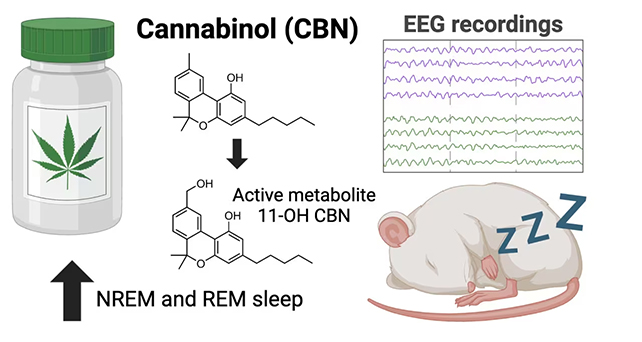Scientists have confirmed that the cannabis ingredient cannabinol (CBN) can increase sleep in rats, highlighting a new avenue for future sleep treatments in humans.
Researchers from the University of Sydney found that a breakdown product of the compound lengthens the periods of both non-rapid eye movement (NREM) and rapid eye movement (REM) sleep in rats, similar to the effects of a popular sleep aid.
Both phases of sleep are crucial for maintaining physical and mental health. REM, also considered the dreaming phase, helps process emotions, while non-REM sleep is associated with essential body repairs.
Although purified CBN products are sold in the US as a sleep medicine, robust evidence supporting their calming benefits has been lacking until now. The results of the study formed the basis for future research into how the substance could help treat sleep disorders.

“Canana folklore has suggested for decades that aged cannabis makes consumers drowsy by building up CBN,” says pharmacologist Jonathon Arnold.
“Our study provides the first objective evidence that CBN increases sleep, at least in rats, by beneficially altering sleep architecture.”
The main psychoactive element in cannabis, delta9-tetrahydrocannabinol or THC, slowly forms CBN in the plant when exposed to heat, oxygen and light.
While THC has an intoxicating effect on the CB1 cannabinoid receptors in the brain, CBN’s influence was much weaker, the researchers found.
In fact, by looking more closely at brain activity, the team found that the metabolite 11-hydroxy-CBN – produced by the breakdown of CBN in the animals – has a stronger effect on CB1 cannabinoid receptors than CBN itself.
Given the importance of these brain receptors in controlling sleep, it is likely that CBN’s metabolites may have a greater impact on sleep than CBN itself.
“It was a surprise that CBN metabolism in the body can have a much greater effect on the cannabinoid CB1 receptors than the parent molecule CBN, which has much more limited activity,” says Arnold.
Medications containing CBN may promote sleep with relatively few side effects on other parts of the brain, although this possibility remains to be explored. Human clinical trials are already underway in patients with insomnia.
“At this stage, our results are limited to testing on rats,” says Arnold. “Further research is needed to see if this translates to humans.”
“Our research encourages further basic and clinical research into CBN as a novel treatment strategy for sleep disorders, including insomnia.”
The research was published in Neuropsychopharmacology.
